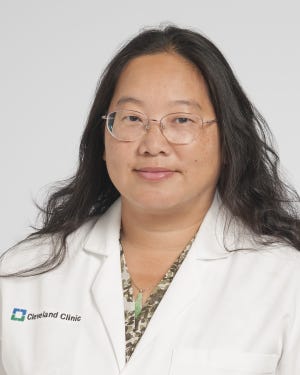
Today’s Healthy Actions column addresses this topic: Can Eastern or alternative medicine and conventional Western healthcare be combined, and are there any dangers in doing so?
It doesn’t have to be one or the other, said this month’s expert, Dr. Yufang Lin of the Cleveland Clinic Center for Integrative Medicine in Lyndhurst. Lin, who is no relation to me, was a primary care physician for more than 14 years before continuing his training. She wanted to help patients find the root cause of illness and help them heal from the inside out.
Q: Can conventional medicine and alternative medicine be combined?
A: Integrative medicine is a healing system that combines the tools and understanding of allopathic (conventional) medicine and complementary and alternative medicine. We evaluate patients from a mind-body perspective and collaborate with patients to formulate a personalized treatment plan. This could include chiropractic, traditional Chinese medicine, acupuncture or herbal medicine, or Ayurveda (Indian healing tradition, which includes yoga) and massage therapy, among others.
Q: Is integrative medicine common?
A: Some centers have programs, but are not run by doctors. We have board-certified physicians who are also certified in integrative medicine.
Q: Are doctors reluctant to combine conventional and alternative medicine?
A: Most people don’t know what it is. Sometimes conventional medicine meets their needs. In conventional medicine, we excel in acute care management like colds, heart attacks and stroke management. But we’re not good at curing or eliminating chronic illnesses like diabetes, hypertension, anxiety, and irritable bowel syndrome.
Some of the causes of these chronic illnesses are lifestyle-related, such as diet, sleep, exercise, and stress management (or lack of). Through integrative medicine, we can manage and eventually stop or even reverse the disease process.
We also had some concerns about interactions between herbs and medications. For example, turmeric is known to reduce inflammation and is an antioxidant. It helps reduce heart disease and has metabolic effects, meaning it can reduce cholesterol and sugar levels. But it can increase your risk of bleeding.
If I have a patient on a blood thinner, the cardiologist is very uncomfortable with the idea of them taking turmeric. I respect that. The risk of having this risk potential is quite low. But if in these cases we cannot use it as a supplement, we use it as a food, which is more widely accepted. The dose of food is usually lower and your body knows better what to do with it.
Q: Do you act as a primary care physician?
A: No. We are consulting doctors to their doctor. We’re trying to help people get better, learn to take care of themselves and maybe visit the doctor less.
Q: What about insurance?
A: A visit to see us for a consultation is usually covered. However, ancillary services such as acupuncture, chiropractic, massage therapy and holistic psychotherapy, which we believe may be beneficial, may not be covered. Some therapies have been shown to be very helpful for chronic pain: such as acupuncture headaches and insurance may cover them. But acupuncture also helps with stress and anxiety, but that’s not covered.
Q: What is the difference between complementary medicine and alternative medicine?
A: The treatments are the same; it’s just the way people use them. Complementary and conventional can be combined. The alternative is when people use them instead of conventional medicine.
We offer supplements.
Q: Are you concerned about people taking supplements without advice?
A: Yes. Many people take them without knowing what they are for. There is also the question of quality and interactions. Not all supplements are the same. You should not buy what is cheapest.
There are several independent inspection entities that offer seals on products. The label means that it meets a certain production quality, but does not speak of efficiency. These entities are the United States Pharmacopeia (USP), the National Sanitation Foundation (NSF International), and the Natural Products Association (NPA). I use Consumer Lab. For general supplements, like vitamins, I would go to the National Institutes of Health for advice on dosing.
Some supplements are intended for certain medical conditions. Don’t take all the supplements randomly because then you will just end up with very expensive urine.
Q: What about lotions or essential oils?
A: Topical creams are medicinal, so they must be of good quality. Essential oils are distilled oils from medicinal herbs and can be very effective in small doses. Conversely, they can be toxic in larger quantities and some are dangerous or toxic to pets, such as tea tree oil.
I do not recommend taking oils orally nor do I suggest putting them directly on the skin. This could cause photosensitivity (burning) or an allergic reaction. They should be mixed with something.
Beacon Journal consumer columnist and medical reporter Betty Lin-Fisher can be reached at 330-996-3724 or blinfisher@thebeaconjournal.com. Follow her @blinfisherABJ on Twitter or www.facebook.com/BettyLinFisherABJ and check out all her stories at www.tinyurl.com/bettylinfisher
